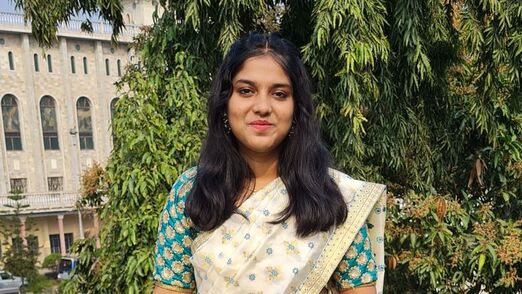|
By Dilinna Ugochukwu “I thought, I have a real connection with this,” said Adrija Jana (she/they), referring to refugee crises. “Why not take it up? Why not use my voice for these people?” Jana is an interdisciplinary Indian artist and activist who started writing in third grade, and their passion for the arts has only grown since. Now they are also drawn to film and theater, and their films have even been accepted to international film festivals. Jana’s work carries a distinctive artistic voice, promotes equity and equality, and is often based on real-life social issues or their personal experiences. Their art brings attention to a diverse range of topics such as domestic violence, period poverty, menstrual stigma, cyberbullying, and LGBTQ+ issues, while also highlighting the stories of refugees and immigrants. “These are issues which I’ve been connected to very intimately,” Jana explains. For example, Jana’s maternal grandmother is a refugee, which has greatly informed how they view refugee crises. Jana recalls how their grandmother told them stories about her father escaping from his home country and bringing her with him, as well as the problems they faced over the years. These stories then influence their artwork, particularly when it comes to their films. Additionally, Jana recalls their own experience with menstrual stigma and lack of proper education. “When I started menstruating in grade five, there was nobody to explain to me properly what was actually happening in my body.” This made them incredibly scared: “I thought I had some kind of serious disease and I would die.” This negative experience helped fuel Jana’s passion for advocating against menstrual stigma and for better menstrual health education, as well as better access to menstrual products. It’s thanks to their unique life experiences and those of people around them that Jana is able to tackle these problems with sensibility. After several people told their sister not to wear “boy” clothing, Jana wrote a poem about choice, invited the judgmental individuals over for tea, and read the poem to them. Jana could see that this poem had an effect on their audience. “That was the point when I realized that poetry or art is not just words on paper. It actually has the power to help someone.” As an artist of color, Jana has unfortunately experienced racism when trying to navigate predominantly white art spaces outside of India. Jana recalls attempting to speak at an American art conference. During the interview, they were asked: “being a person of color, why do you think you're worthy of coming here?” They were not asked whether they were qualified, but about how they could prove a person of color deserved to be let into that space. This experience left Jana dumbfounded. Informed by their own experience with others taking advantage of racial power imbalances, Jana believes “it is important to talk about racial inequality in the arts.” If we do not discuss this topic, people will take advantage of the situation and could end up—intentionally or unintentionally—harming others. For this reason, Jana wants young artists of color to embrace speaking up. “If you are seeing that something is going on around you that is wrong, that is not correct, or that is something you want to raise your voice against, go ahead.” Even if people disregard BIPOC teens, keep trying to make a difference. As Jana said, "What matters is your voice and not how people take your voice.” By bringing “taboo” ideas out into the open, you can destigmatize important topics. “That itself is something very, very big.”
0 Comments
Your comment will be posted after it is approved.
Leave a Reply. |
Archives
February 2023
Categories
All
|

 RSS Feed
RSS Feed